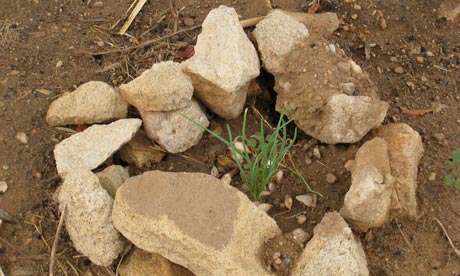
An onion plant encircled with stones. Photograph: Madeleine Bunting for the Guardian
The village of Dandoli is perched on a slight rise on a rocky plateau so that we see the distinctive thatched roves of the grain stores silhouetted against the harsh sun as we approach down the rough track. The village is built of neatly cut rocks, but the low buildings give little shelter. Dandoli is one of a string of villages alongside a small river, and their livelihood depends on its water.
The chief, Ambadimgue Temboli, greets me with great ceremony and introduces his committee and advisers. He is nearing 80 and admits his eyesight is failing, but his mind is crystal clear and he laments the loss of the forests which used to sustain his people and their land. Hunger was something he knew little about as he grew up, he explains. If the harvest was not good, there were always animals and birds to hunt and wild fruits to gather. But the thick forests he knew as a young boy have disappeared. And now the sand and wind are refashioning the land around him.
A few miles from Dandoli, I was shown a graphic illustration of what he was talking about. The land was riven by a massive gully, about 500 metres wide; it had created a strange landscape scored and and pleated by the rain and wind, with pillars of sandy soil still standing. It had been an area of farmland, but was now in the process of being stripped back to bare rock and scree.
Chief Temboli says the rainy season is shorter and when the rain comes, it's heavier. Flash floods can cut small valleys and then pour silt into the river. A few years ago, heavy rain led to flooding so that the river burst its banks and washed away the small vegetable plots on which the villages depend for income. A small local non- governmental organisation, AEDM, has helped them to build new plots using better techniques.
As the mayor explains, the key is composting. He recounts with pride the methods they have adopted using a mixture of ash, animal dung and vegetable waste. Standing there by the compost bins, I was struck by how such huge issues as climate adaptation and food security for millions of people come down to such micro matters as composting. It is not primarily technology that is needed – although it has its place – but far more prosaic solutions which are well within the reach and capability of small communities.
The vegetable plots have been rebuilt with painful effort. Patches of level bare rock are used and low stone walls are built to create a form of raised bed. More stone walls, a foot deep, are laid in a lattice work so that each growing area is no more than 2ft square. The walls help keep the soil in place, preventing it from being washed away or the wind in the dry season from dispersing it as dust. The women gather baskets of earth enriched with compost to fill the beds. It is a back-breaking labour. During the growing season, the women fill gourds with water several times a day from the river, 200 yards away, to sprinkle over their tiny plots.
The biggest crop is onions, which can be sold in the local market, but AEDM has introduced other varieties of vegetables to ensure a wider range of nutrients for the villagers than just the staple millet on which they depend for the bulk of their diet.
I notice one plot – it is encircled with stones but there is room for only a few plants, another plot has a single onion seedling. The effort is immense, the results are pitifully small to our eyes, but the villagers talk with enthusiasm about the difference these onion plots are making.
When the politicians negotiate climate adaptation finance in Cancun next month, it will be these kinds of small-scale schemes replicated a million times which can protect lives from hunger. But the challenge to get funds down to this kind of micro level is daunting; it's one of the paradoxes well-established in aid and now evident in climate adaptation, that the simplest, cheapest small-scale solutions are often the last to get the funding they need.
http://www.guardian.co.uk/global-development/poverty-matters/2010/oct/21/mali-climate-change-crops-adapting-environment











No comments:
Post a Comment